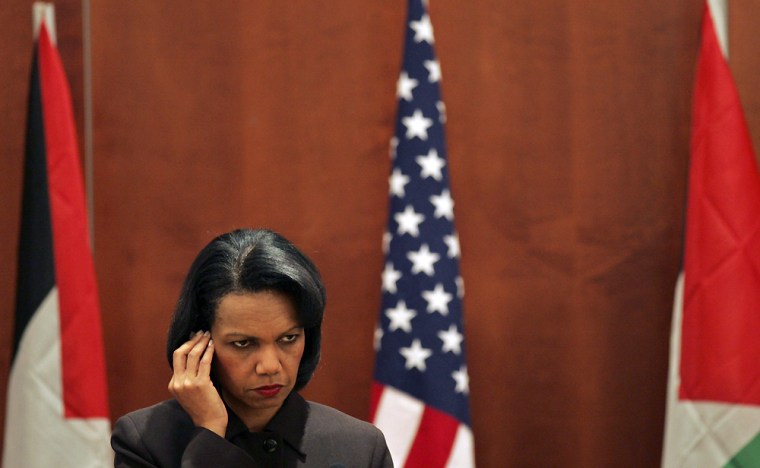Secretary of State Condoleezza Rice called on Israelis and Palestinians Thursday to increase their efforts to achieve a long-stalled peace deal, saying neither side should take actions that would prejudge a final accord.
“Hopefully we can take this moment to accelerate our efforts and intensify our efforts toward the two-state solution that we all desire,” Rice said at a news conference with Palestinian President Mahmoud Abbas.
Abbas said talks among Palestinians to achieve a national unity government aimed at ending an international aid boycott have reached a “dead end.” Abbas, a member of the Fatah party, is trying to assemble a more moderate Palestinian government after elections in January handed Hamas control.
Hamas’ support of terrorism and refusal to recognize Israel’s right to exist prompted the United States, Israel and other nations to impose crushing economic sanctions.
Asked about Abbas’ options now, Rice declined to get involved.
“That’s for the president to decide — he’s the elected official, not me,” she said.
Arab states raise travel concerns
At a U.S.-backed Mideast democracy and development summit later, moderate Arab states asked the United States to do more to ease travel restrictions on the Palestinians. Egyptian Foreign Minister Ahmad Abou al-Gheit told reporters the U.S. must “encourage Israel to soften the measures that they have been applying, at least in the West Bank.”
Rice said she hoped a lasting cease-fire would help address those concerns. She also said the Bush administration wants to ask Congress for money to aid the development of a tougher Palestinian security force.
“It goes without saying that if you want the Palestinians to take more responsibility for security, then they have to have adequate security forces to do it and I think the Israelis understand that,” Rice said in a media roundtable following a summit meeting.
Standing alongside Abbas, Rice addressed aspirations for a Palestinian state.
“The United States has made clear that we expect it to be a viable and contiguous state when it is created,” she said. “Secondly, that no actions that are being taken now should prejudge the outcome of a final status agreement. That means very clearly that if actions are being taken now, they will not be considered by the United States to have prejudge the outcome of final status.”
Israeli's obligations outlined
Rice also said Israel has obligations under the peace blueprint known as the road map. Requirements regarding Jewish settlements in the Palestinian territories are “clearly articulated,” she noted.
Rice accompanied Bush during morning sessions concerning Iraq in nearby Amman before breaking away for her meetings later with the Palestinian and Israeli leaders.
“Our government strongly believes in the two-state solution,” Bush said Thursday at a news conference attended by Rice. “I believe it’s in the Palestinian people’s interest that they have their own state and I believe it’s in Israel’s interest that there be a democracy on her border and therefore we’re working to that end.”
Olmert reached out to the Palestinians on Monday, saying he was prepared to grant them a state, release desperately needed funds and free prisoners if they choose the path of peace.
Rice’s trip threw U.S. weight behind a Gaza cease-fire announced last weekend, with U.S. officials hoping the cease-fire would extend beyond Gaza to the West Bank and bolster efforts for renewed peace talks.
From her meetings with Abbas, Rice went to Jerusalem and held sessions with Israeli Prime Minster Ehud Olmert and Israeli Foreign Minister Tzipi Livni.
Israeli official opens door
Foreign Ministry spokesman Mark Regev told reporters that Olmert wants to extend the cease-fire to the West Bank once it has proven effective in the Gaza Strip.
In response to Rice’s statement that Palestinians should be able to live in dignity, Regev said Israel is willing to lift restrictions at checkpoints when the terrorist threat subsides. “We don’t have a roadblock because we are not nice people. We have a roadblock because we have a terrorist threat,” he said.
While U.S. officials are reluctant to express optimism about the prospects, a long-lasting political deal between Israel and the Palestinians — backed by several Arab countries — would be a considerable victory for the Bush administration and is widely considered a necessity to quiet violence throughout the region, including Iraq.
Rice told reporters that Arab states attending the Mideast democracy summit expressed interest in supporting the fledging Iraqi government. And while she said the U.S. would address the two conflicts on their own merits, there were ties.
“What is clear is that in all of those places, you have the obvious contest between moderate forces and extremist forces, and I think that’s what common to all of them,” Rice said. “And you do have in all of those cases as well, an Iranian factor that is undeniable.”
